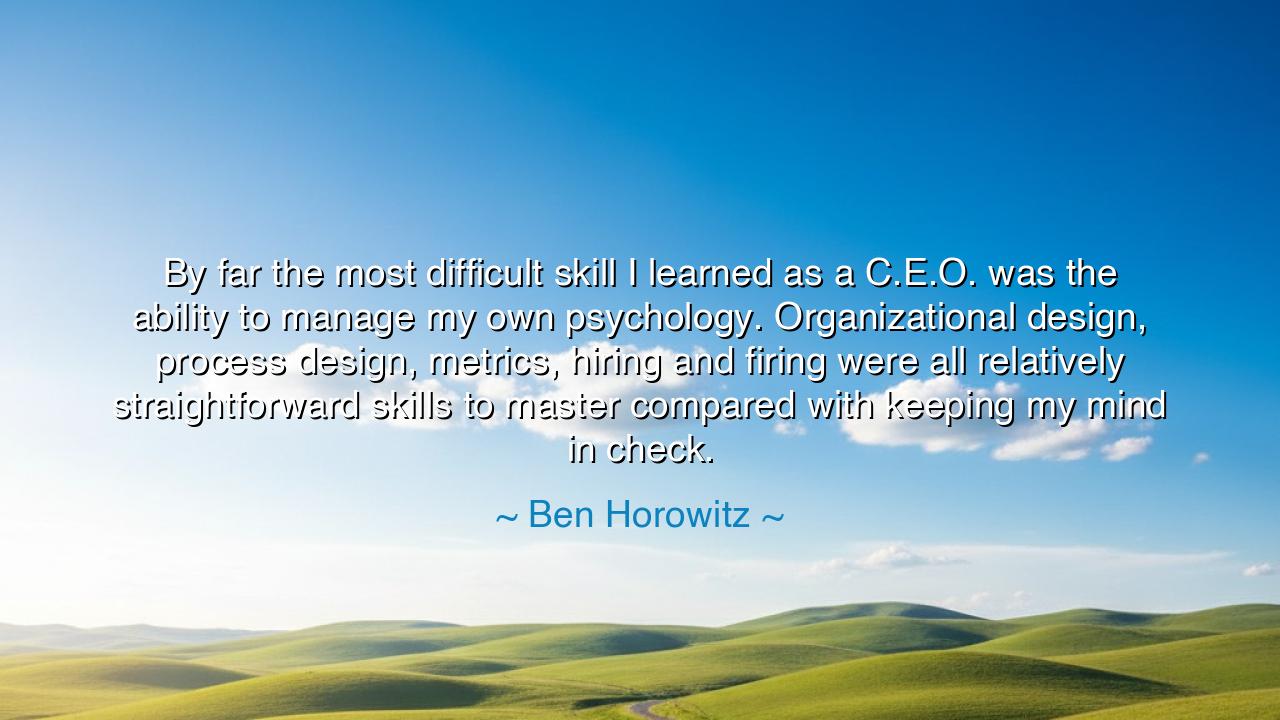
By far the most difficult skill I learned as a C.E.O. was the
By far the most difficult skill I learned as a C.E.O. was the ability to manage my own psychology. Organizational design, process design, metrics, hiring and firing were all relatively straightforward skills to master compared with keeping my mind in check.






In the solemn and penetrating words of Ben Horowitz, the declaration — “By far the most difficult skill I learned as a C.E.O. was the ability to manage my own psychology. Organizational design, process design, metrics, hiring and firing were all relatively straightforward skills to master compared with keeping my mind in check.” — speaks with the clarity of one who has wrestled not only with the storms of business, but with the deeper storms of the soul. His words rise above the realm of commerce and management to touch a timeless truth: that the greatest battle any leader will ever face is within themselves.
The meaning of this quote lies not in the mechanics of leadership, but in the mastery of the self. Horowitz reminds us that while systems and structures can be learned through study, and decisions made through logic and reason, there is no manual for fear, doubt, and despair. The human mind, especially under the weight of responsibility, is a battlefield of contradictions — courage contending with anxiety, clarity wrestling with chaos. To lead others, one must first learn to govern the unruly kingdom of one’s own thoughts. The ability to “keep the mind in check” is therefore not a small skill, but the highest form of leadership — a discipline forged in solitude and trial.
The origin of this wisdom arises from Horowitz’s own journey as a Silicon Valley founder and C.E.O., navigating companies through times of immense uncertainty and peril. He faced layoffs, crises of survival, and sleepless nights filled with the unbearable tension between duty and despair. His insight was not learned from textbooks, but earned in the crucible of experience — where success is uncertain and failure whispers constantly in the ear. In those moments, he discovered what all great leaders throughout history have found: that no strategy or process can save an enterprise if its leader succumbs to panic or hopelessness. To command the world, one must first command oneself.
This truth echoes the teachings of the ancients. Consider the philosopher Marcus Aurelius, emperor of Rome, whose empire spanned the known world — yet his greatest writings, preserved in Meditations, are not about conquest or governance, but about mastering the inner turmoil of the mind. “You have power over your mind,” he wrote, “not outside events. Realize this, and you will find strength.” Like Horowitz, Marcus knew that a leader’s greatest enemy is not the enemy at the gates, but the fear in his own heart. Empires fall not because of external blows, but because their leaders lose the stillness within.
The task of self-mastery, then, is not an act of denial but of discipline. To “manage one’s psychology” does not mean to suppress emotion, but to learn its rhythm — to feel fear without being ruled by it, to know doubt yet act decisively, to face failure and still stand tall. The C.E.O. must, in this sense, become like the captain of a ship in the storm: though the sea rages and the crew trembles, his calm becomes their compass. Horowitz’s words remind us that leadership is less about knowledge than about emotional endurance, less about controlling others than about containing oneself.
History is filled with those who failed not because they lacked skill, but because they lost this balance. The mighty Napoleon, whose genius once reshaped Europe, was undone not by the armies of his enemies but by the storms of his own ambition and impatience. In contrast, Nelson Mandela, confined for 27 years in prison, learned to master his thoughts so thoroughly that even behind bars he became the freest man in the world. When released, he ruled not through vengeance, but through serenity — proving that true power begins with mastery of the inner world.
Let this be the lesson passed down: before you seek to lead others, learn to lead yourself. Before you attempt to shape the world, shape the temper of your mind. Train your thoughts as a warrior trains his sword — through daily vigilance, through self-reflection, through the steady practice of calm amid turmoil. The greatest victories in life are not won in boardrooms or battlefields, but in the silent chambers of one’s own mind.
And so, my listener, remember the teaching of Ben Horowitz: the hardest skill to master is the mastery of oneself. When the storms of life come — and they always will — tie down your thoughts as sailors tie down their sails. Anchor your heart in purpose, and do not let the winds of fear steer you from your course. For the leader who conquers his mind can weather any storm, command any empire, and guide others not by force, but by the quiet power of inner peace.






AAdministratorAdministrator
Welcome, honored guests. Please leave a comment, we will respond soon